Dive into a world of creativity!
Well I've Noticed That Crowley Switches Between Them - But I Didn't See The Pattern - Blog Posts
You Say Potato, I Say Excellent! Or blocking, accents and legacy of morality tales in ‘The Resurrectionists’ minisode PART II
Alternate title: how Aziraphale’s naivety in this episode was supposed to make you a bit outraged
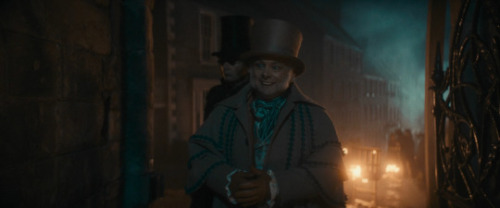
I have to shout out to @bowtiepastabitch for their AMAZING historical analysis of this minisode - it prompted me to finish this long ramble that has been drifting in my notes. Anyway, I have a major obsession with the ways blocking and dialogue interplay in Good Omens - you can check out my analysis of the blocking in the flashbacks in S1. But The Resurrectionists is really something special. This got so long I am splitting it into two parts.
What we see in this minisode is a morality tale - a genre of children’s literature that was extremely popular in the early 1800s where the minisode is taking place. Catch up on the historical background in Part I.
When looking at this minisode, it is really important to look at two complementary narrative tools - Crowley’s accent and the placement of Aziraphale in relation to Crowley. Through the minisode, Crowley switches between his standard English accent and a delightful Scottish accent. But the switching isn’t random!
Scottish lines = character Demon Crowley, who moves the plot of the story along
English lines = Crowley, the moral guide leading Aziraphale
Additionally, the two of them swap sides in their blocking frequently in this episode. Their standard placement is A/R + C/L but the swap to C/R + A/L is almost the norm in this minisode.
Analyzing Blocking and Dialogue
We open in the graveyard, with Aziraphale and Crowley in their standard placement, observing the statue of Gabriel. But then they notice Elspeth, digging up a corpse. When Aziraphale approaches Elspeth to inform her that her actions are Not Good, he actually ends up swapped with Crowley and finds himself on the left because what he is doing - making moral judgments on the actions of Elspeth with no understanding of what led her here - is doing Good, not good.

The next scene finds Crowley helping Elspeth cart the corpse away from the graveyard, while the trio debate all the other ways Elspeth could make money - Aziraphale suggests running a bookshop, farming, weaving, giving the standard Good party line about hard work blah blah blah. Aziraphale remains on the left - after all, those supposed options are completely unrealistic, unobtainable professions for someone in Elspeth's socioeconomic position. They aren't remotely helpful suggestions.
Aziraphale only finds himself back on the right when he and Crowley are introduced to Wee Morag, and have some time to listen and observe the reality of their situation.
Then, off we go to complete our journey to sell the body. Aziraphale and Crowley find themselves having a debate about morality, but Aziraphale is again ON THE LEFT as he waxes poetic about the virtues of poverty - doing Good, not good again. What I loved here was you saw the clear purpose between Crowley’s two accents as he switched mid-line -

Crowley: (SC) Oh, I'm down with wicked! (EN) Anyway, is it wicked? She needed the money.
Upon reaching the lodging of Mr. Dalrymple, FRCSE, Crowley and Aziraphale take their standard places but this scene has one really important moment that I want to highlight. When they open the barrel to find the rotted corpse, the look on Crowley’s face is so telling. He often finds Aziraphale’s machinations amusing even when they are annoying, but here he looks decidedly disappointed. Aziraphale might have done Good by rendering the body unsellable, but what good did it do? The body is still been un-interred. Elspeth has wasted her energy, and has made a terrible first impression of the surgeon whom she needs to pay her for her services. It looks like Crowley wants to say something, but he stops himself and clenches his jaw. The PATIENCE he is showing to Aziraphale - this is a quality that Crowley has in SPADES but we really see him exercise it here.
After the discussion with Mr. Dalrymple, in which Aziraphale realizes the importance of dissections for educating medical students and thus leading to better care for the living, he asks the right question - why should the poor have to risk death to obtain bodies? But he let's himself get sidetracked by a blatant appeal to his emotions...
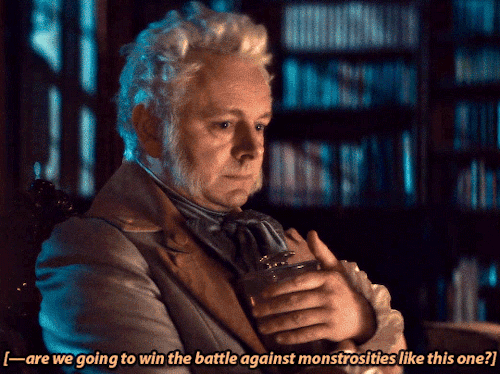
At this point, Aziraphale goes all in on body snatching being Good. Which... it still isn't because it is based on a broken system that disadvantages the poor? FOCUS, angel. He even goes as far as to offer to help Elspeth and Wee Morag in obtaining another corpse but note that again, he is on the LEFT -
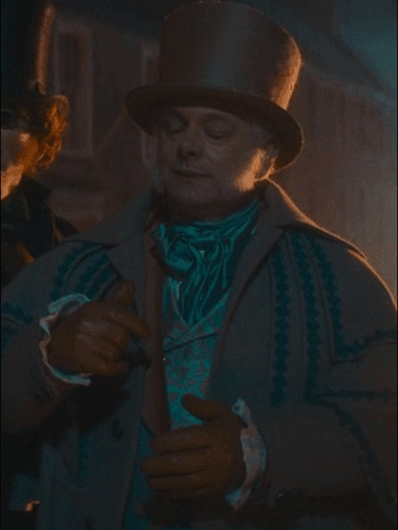
Remember, Wee Morag is deeply conflicted about the morality of body snatching, and instead of explaining anything to her (like, that having your body dissected won't keep you out of heaven would be start) Aziraphale just sort of joins Elspeth in pressuring her to join in - which is pretty awful and coercive, but gee if that isn't just heaven's playbook for doing Good, not good.
So we return to the graveyard, and this is where everything goes sideways. Aziraphale spends basically this entire sequence on the left. First, he notices the ingenuity of the grave guns but fails to acknowledge the travesty of so much energy being spent on protecting wealthy corpses while the poor suffer. Then, the tragedy strikes. After Wee Morag is shot, Aziraphale wastes time justifying saving her, resulting in her dying before he can act. And after all this, after the heart break of seeing her partner die, we see Elspeth come to the logical conclusion. If body snatching is Good, then might as well take Wee Morag off to Mr. Dalrymple, right?
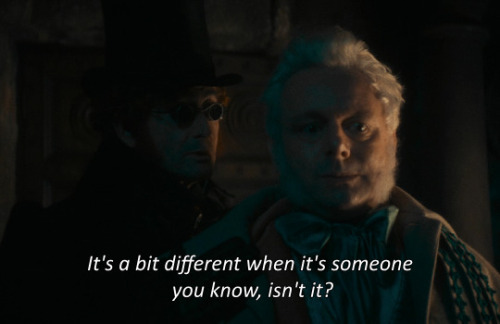
What shouldn't be overlooked is what takes place when Elspeth gets Wee Morag's body to Mr. Dalrymple. Because while Aziraphale is very clearly illustrating the dangers of black and white morality through religion, Dalrymple is showing that black and white morality through science is just as bad. Dalrymple has unshakable belief in the power of science and knowledge to alleviate human suffering and sees his work at Good. He cares about preventing illness, but ignore his role in perpetuating poverty - an unfortunate side effect of rigid belief systems of all shapes and sizes. He is downright cruel to Elspeth.
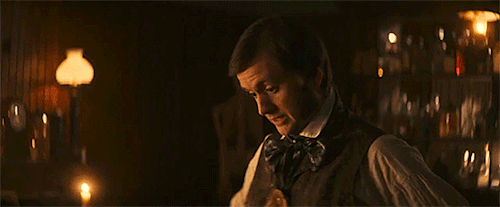
This is already getting real long, so we won't go into the absurdist comedy of the scene in the tomb - suffice to say that the surreal nature of Crowley's bargaining with Elspeth smacks of a fantastic tales of pacts made with the devil. It's delightfully unhinged.
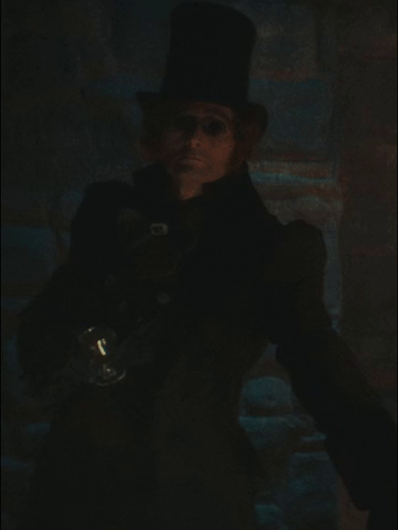
The one line I think worth pointing out?
"Do I sound like a goat?"
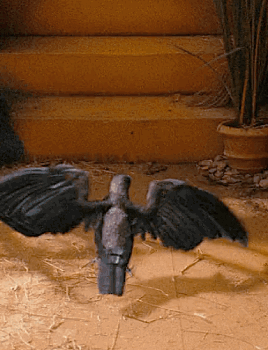
I think this line is key in the narrative connection between the three minisodes in S2. All three flashbacks show Crowley and Aziraphale engaging in acts of deception, but they all have important differences:
In A Companion to Owls, the two work together, and they manage to pull off the trick and evade punishment.
In Nazi Zombies from Hell, Aziraphale comes up with a plan and Crowley goes along with it, and they barely manage to evade punishment.
In The Resurrectionists, Crowley comes up with a plan and Aziraphale goes along with it, and Crowley is sucked down to hell.
I think it's worth noting just how silly Crowley is in the first two minisodes. Bildad and Scottish Crowley are FUN even when dealing real heavy shit. Just a complete joy to watch. And we never see that level of silly from him again. Whatever happened in hell was clearly really bad since the next time we see him in St. James Park he is asking for holy water. He may have moments, but he is never the same.
Questions, comments, additional thoughts? Lay them on me. I'd love to dig into new lines of inquiry on this minisode because I just love it so much <3